I rented Hick without knowing the first thing about it. I had decided to try Redbox for the first time, and the title appealed to my sensibilities. This is often how I go about deciding what it is I’ll watch or read next; a good title will sell me much more easily than a glowing review or a friend’s recommendation ever could. Having grown up in a trailer park in the southern part of New Jersey—which may as well be Kentucky for how vastly it differs from those northern areas adjacent to New York—I was confident I’d find something to enjoy in a movie whose title could have very well described any and all of my neighbors.
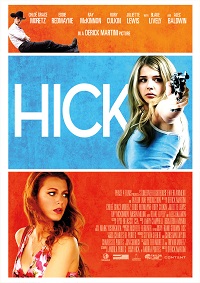 Put simply, I really liked Hick. It’s a movie that I’m predisposed to enjoy. There are kids acting like adults and adults acting like kids—one of my favorite tropes in anything. There’s Patsy Cline playing in the background. There are drifters and grifters. There’s Alec Baldwin. Sold. And though I came away thinking there were a few moments that missed the mark, and that the overall tone of the film was somewhat difficult to pin down, I didn’t regret my rental in the slightest. I even went so far as to tweet about it.
Put simply, I really liked Hick. It’s a movie that I’m predisposed to enjoy. There are kids acting like adults and adults acting like kids—one of my favorite tropes in anything. There’s Patsy Cline playing in the background. There are drifters and grifters. There’s Alec Baldwin. Sold. And though I came away thinking there were a few moments that missed the mark, and that the overall tone of the film was somewhat difficult to pin down, I didn’t regret my rental in the slightest. I even went so far as to tweet about it.
Imagine my surprise to find, only minutes later, that my kind-but-lukewarm endorsement had been retweeted by the film’s Twitter account, and then by Derick Martini, the director. Judging by the feed on both accounts, it seemed every tweet that even resembled a positive comment about the film had been retweeted to the masses. It wasn’t until I searched Martini’s name—and spoke with Eric Melin, Scene-Stealers’ Editor-in-Chief—that I learned perhaps why that was: Hick was a more contentious film than I ever could have realized. That’s putting it kindly. The truth is, Hick has a 0% rating on Rotten Tomatoes after aggregating nearly twenty reviews. Exactly zero percent.
I read the reviews. Some of the criticism made sense, and many reviewers shared my view on the challenge of the film’s wavering tone. But what was unmistakably present in the majority of these reviews was this surprising—and I’d venture: biased, unfair, and unwarranted— sense of vitriol that I hadn’t come across in film crit in some time. People hated this film. Consider Mark Olsen, for the Los Angeles Times: “Hick is part road movie and part coming-of-age story but mostly plays like some creepy-perv fantasia.” Or James Rocchi, for The Playlist, who calls the film, “a black blot of shame for everyone who had a part in its making.” What? Had we all seen the same movie?
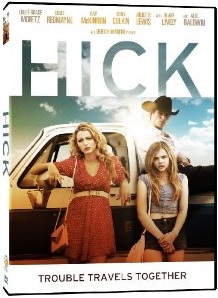 That’s when something else caught my eye on Rotten Tomatoes: the audience ratings. I hadn’t seen it at first. Aggregating nearly 4,000 user reviews, Hick was averaging a rating of 3/5, an approval that stood in direct contrast to what the journalists had to say. So I wasn’t alone.
That’s when something else caught my eye on Rotten Tomatoes: the audience ratings. I hadn’t seen it at first. Aggregating nearly 4,000 user reviews, Hick was averaging a rating of 3/5, an approval that stood in direct contrast to what the journalists had to say. So I wasn’t alone.
I reached out to Eric, who has been kind enough to publish so many of my rambling, circling-to-land thoughts about underdog films on this site before. I told him about my experience with Hick, about my shock and awe at how it had been treated critically. And now that I had something like a direct line with the director, would he be interested in letting me unpack this complicated, contentious, but worthwhile film? He agreed, and Derick Martini was kind enough as to indulge some questions from yours truly. Below is an edited-down version of our conversation. It’s a discussion that I think you’ll find very interesting, and I’m so gracious for Derick’s candor.
But before I get to it, let me say this: Hick is not a perfect film. I can’t even promise it’s a film that most people will enjoy. It swims against the tide of what the viewer is comfortable with, what we expect out of coming-of-age stories. It objects to the most agreed-upon definitions of a satisfying narrative arc. And there are scenes that are incredibly difficult to watch. However, I’m not sure any of those observations equate to Hick being a bad film, only a challenging one. It’s certainly not the canker sore on cinema’s cheek that the aforementioned reviews have made it out to be. There is an audience out there who has really enjoyed this movie—myself included among them—and there’s something to be said for that.
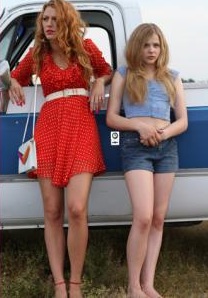 I’m hoping this piece, and the interview below, will create a space for a more thoughtful discussion than has existed around the film thus far, and, moreover, that it will encourage you, the reader, to rent it and decide for yourself.
I’m hoping this piece, and the interview below, will create a space for a more thoughtful discussion than has existed around the film thus far, and, moreover, that it will encourage you, the reader, to rent it and decide for yourself.
Here’s the official synopsis of Hick: “Small town teenager Luli (Chloe Grace Moretz) escapes to Las Vegas, leaving behind her alcoholic and abusive parents. Armed with her smarts, a pistol and pocket money, she hitchhikes her way west. Along the way, Luli crosses paths with Eddie (Eddie Redmayne), an unstable rebel with questionable motives and Glenda (Blake Lively), a cocaine-snorting drifter on the run. Adapted from the critically acclaimed novel by Andrea Portes, this powerful story pulls you into a provocative world of drugs, seduction and murder.”
—
Vincent Scarpa: One of the things that interests me the most about Hick is the way in which, for Luli, sexuality is linked to violence. This shows up throughout the course of the film: at the beginning, when she holds her new pistol to the mirror and reenacts what she’s seen on TV, simultaneously looking down her shirt and readjusting her breasts. When she holds Lux (Bob Stephenson), an intruder in her house as far as she is concerned, at gunpoint and asks, “Do you think I’m pretty?” She asks the same question of Eddie after the incident at the bar in Wyatt. To me, the crux of the film really does seem to rely on navigating this balance between sex and violence, and I wondered if you might talk a bit about why that interested you. Is this the product of Luli’s poor upbringing, of being at the cusp of puberty, of her having seen too many movies, or a combination of all of the above?
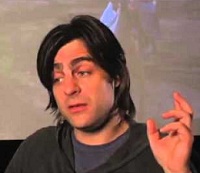 Derick Martini: First of all, what kind of parents let their 13-year-old kid receive a gun on her birthday and allow her to keep it? Maybe in the 1800s, but nowadays you have to be a very poor parent to allow that sort of thing. This was in the novel and also in the screenplay. This piqued my interest. Instead of shrugging it off as incredulous, I became very curious about what Luli was going through. How was she coping with this sort of damaged parenting? All the while, yes, she is hitting puberty and her body is changing and her hormones are raging.
Derick Martini: First of all, what kind of parents let their 13-year-old kid receive a gun on her birthday and allow her to keep it? Maybe in the 1800s, but nowadays you have to be a very poor parent to allow that sort of thing. This was in the novel and also in the screenplay. This piqued my interest. Instead of shrugging it off as incredulous, I became very curious about what Luli was going through. How was she coping with this sort of damaged parenting? All the while, yes, she is hitting puberty and her body is changing and her hormones are raging.
I believe the gun and Luli’s sexuality are two separate elements of the story that loosely connect at times. For example, when Luli is holding the gun and practicing her “shooting poses” in the mirror, she suddenly feels powerful. Then when she notices her body changing, she also feels a power in that as well, but a less tangible power; more amorphous. Whereas the gun is the gun—it’s a universal symbol of power—her budding sexuality is much more confusing to her. Does it give her a sense of empowerment? Sure, but she is extremely insecure about it, because it isn’t tangible like the gun.
This is why you see Luli—less so in the Lux scene, because Lux is not as meaningful of a character to her—in that scene with Eddie after the pool hall incident be completely vulnerable and ask Eddie the question, “Do you think I’m pretty”? She truly doesn’t know the answer. Her parents certainly are not the types to compliment her or raise her self-esteem. So who else is there? Eddie. And on the heels of watching Eddie bludgeon a would-be attacker and then convincing her that he saved her and would never sell her off, she has been emotionally disarmed. Then, when Eddie sort of throws away the line about her being “smart and pretty,” Luli is genuinely curious if he believes it.
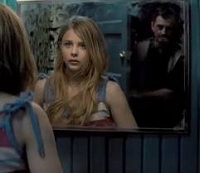 As written, she wasn’t as vulnerable, she was snarkier about it. But as we started to film the scene, it felt wrong to have Chloe play that question in a defensive way. It didn’t feel truthful. So, in my eyes, she’s looking for the truth to that question, and it isn’t an easy question to ask a guy who she is simultaneously attracted to and afraid of.
As written, she wasn’t as vulnerable, she was snarkier about it. But as we started to film the scene, it felt wrong to have Chloe play that question in a defensive way. It didn’t feel truthful. So, in my eyes, she’s looking for the truth to that question, and it isn’t an easy question to ask a guy who she is simultaneously attracted to and afraid of.
VS: The “pistol for a pistol” that Luli receives at her 13th birthday party that you’ve mentioned, in many ways, sets the film on the course of action. We know that, by the film’s end, the gun will go off. And in a movie where our narrator is put in many different kinds of danger, I wondered if there was any intended alleviation of worry or concern for Luli’s safety by giving her a gun at the outset.
DM: The purpose the gun serves, for me, is that the audience knows it is present, in her bag, and could be used at any time. It adds another dimension of tension throughout the course of the film. We did not reinvent the wheel on that one. However, I was asked once by someone after a screening, “Well, if she had the gun in her bag, why didn’t she shoot the guy in the pool hall?” Honest question. Honest answer: She’s 13 years old, and despite the fact that during her “private moments” alone she’s playing with the gun in the mirror, it would be out of character for her to be savvy enough to reach into her bag and shoot a guy that is fiercely and quickly coming after her in closed quarters.
VS: Framing the film around Luli’s sketches that tell the story of her brother who has died in infancy, her brother “born the color of light coming off the moon,” is a device that first struck me as somewhat divisive, but by the end seemed to crystallize. I wondered if you might talk a bit about what the effect of that framework is. What characteristics does it lend to Luli? To her parents? Is it specified in the screenplay—or perhaps in the film, and I’ve missed it twice—how long after these events the film begins?
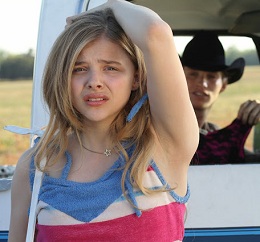 DM: You didn’t miss anything. The baby-brother story line implies that the loss of the child has corroded her parents relationship to its very core. Maybe even corroded her parents’ souls. They are not the type, to me, who would be able to emotionally overcome the death of a child—even stable people never overcome a tragedy like that. Ironically, it’s Luli who seems to cope the healthiest—which is what the sketches are all about. Those sketches are a release for her. A way for us, the audience, to see and understand the effect this loss has had on her. One of the pieces of research I had Chloe do was to read The Catcher In The Rye in order to show her how Holden Caufield was coping with the loss of a sibling.
DM: You didn’t miss anything. The baby-brother story line implies that the loss of the child has corroded her parents relationship to its very core. Maybe even corroded her parents’ souls. They are not the type, to me, who would be able to emotionally overcome the death of a child—even stable people never overcome a tragedy like that. Ironically, it’s Luli who seems to cope the healthiest—which is what the sketches are all about. Those sketches are a release for her. A way for us, the audience, to see and understand the effect this loss has had on her. One of the pieces of research I had Chloe do was to read The Catcher In The Rye in order to show her how Holden Caufield was coping with the loss of a sibling.
VS: I like to think of Eddie as being a Western Humbert Humbert, with gunslinger sex appeal rather than poetic charm, and I imagine it must have been one of the more difficult roles to cast. What brought you to Eddie Redmayne?
DM: I saw him in the play RED. Thought he was brilliant. Then when Hick came along and I cast Chloe, she and her brother Trevor brought him up, which was music to my ears. I knew I didn’t have to audition him—I met him over Skype and just asked “Do you want this?”
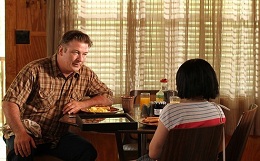 VS: I find the soundtrack of Hick to be really fascinating. What was the intended effect of juxtaposing the events of the film—sex, danger, rape, coke, and everything in between—to some of the most inviting, familiar country classics? It’s an interesting device, and I’d love to know the genesis of it.
VS: I find the soundtrack of Hick to be really fascinating. What was the intended effect of juxtaposing the events of the film—sex, danger, rape, coke, and everything in between—to some of the most inviting, familiar country classics? It’s an interesting device, and I’d love to know the genesis of it.
DM: It’s pretty much defined as contrapuntal, I guess. I think I have a tendency to do that at times, when it works—take an extremely violent scene and lay in a tune that counters the violence, as opposed to playing a tune that plays strongly with it. Take Patsy Cline, “Sweet Dreams”—it’s this melodic, soft, but at times operatic tune that ebbs and flows with emotion. It’s a love song. I chose that for the scene where Eddie is most unhinged and chasing Luli through the blueberry field, as opposed to laying in a piece of score that tells the audience, “You should be scared for her here”. Instead I have, as you say, an “inviting” tune there. I like that. It feels right. All the tunes in the movie feel right to me. Using Bob Dylan’s “Suze” as the main—using a lot of Dylan in this film—felt right to me, mainly because I feel the movie is very much like a Dylan tune. Sometimes you have no clue what he’s talking about, but it sure is interesting.
VS: What, if any, were your concerns about releasing this film into the world? Were you cognizant of the more controversial issues the film was tackling, or was the screenplay so organic that it belied the real risks of the material?
 DM: Hindsight is 20/20, but not in this case. On my first film, Lymelife, I had complete autonomy. My producer Jon Cornick and I had raised all of the money ourselves. It was my script, so if I wanted to completely change the direction of the story, I could have, and I did with certain scenes. With Hick, Andrea Portes, the author/screenwriter, and her brother, producer Charles De Portes, raised all of the funds. That’s not to say I was handcuffed to the script because I wasn’t. However, the script was pretty much what the book was, and in that way it was organic to shoot what was on the page—even though, as a screenwriter, I knew it was risky material. Forget the sexuality—just the randomness of the story seemed to break a whole bunch of basic screenwriting principles I was taught. But this intrigued me as opposed to scaring me off. I was completely aware that the script was a creative risk. But isn’t that what independent filmmaking is all about? Taking risks? I think so. And, for me, it did work. It hit all of the emotional notes that were on the page, and then some.
DM: Hindsight is 20/20, but not in this case. On my first film, Lymelife, I had complete autonomy. My producer Jon Cornick and I had raised all of the money ourselves. It was my script, so if I wanted to completely change the direction of the story, I could have, and I did with certain scenes. With Hick, Andrea Portes, the author/screenwriter, and her brother, producer Charles De Portes, raised all of the funds. That’s not to say I was handcuffed to the script because I wasn’t. However, the script was pretty much what the book was, and in that way it was organic to shoot what was on the page—even though, as a screenwriter, I knew it was risky material. Forget the sexuality—just the randomness of the story seemed to break a whole bunch of basic screenwriting principles I was taught. But this intrigued me as opposed to scaring me off. I was completely aware that the script was a creative risk. But isn’t that what independent filmmaking is all about? Taking risks? I think so. And, for me, it did work. It hit all of the emotional notes that were on the page, and then some.
I remember when my editor, Mark Yoshikawa, and I had a decent cut, we brought my producer Jon Cornick up to Rhode Island where we were editing to take a look at it. After the screening, Cornick said, and I’m paraphrasing, “We made a beautiful film with some remarkable performances, BUT this is a very controversial film we have on our hands and it has to be handled properly. If we don’t get out ahead of this, marketing-wise, and let people know how dark and heavy this film is at times, we’re going to get crushed by the critics.” Jon had a plan, several plans actually, to do early word-of- mouth screenings before the premiere at TIFF, targeting the audience we all felt this would appeal to. Fans of Chloe and Blake, that age range, fans of risky and experimental films in general, etc. Let them tweet out their responses and we’ll focus on those that truthfully reflect the film and publicize them.
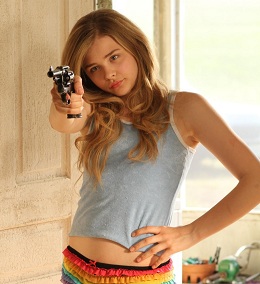 Now this is where not having complete autonomy really hurt us. Cornick’s plans of “positioning” the film properly before TIFF fell on deaf ears. The other producers, who raised the money, were running around Hollywood, taking meetings with agents, setting up screenings for agents—clearly not our target audience. I did do my own director’s test screenings for editorial purposes, but that was not what Cornick was interested in. He had the right idea, but we didn’t hold the purse strings and couldn’t make it happen. And that hurt us. It hurt the movie.
Now this is where not having complete autonomy really hurt us. Cornick’s plans of “positioning” the film properly before TIFF fell on deaf ears. The other producers, who raised the money, were running around Hollywood, taking meetings with agents, setting up screenings for agents—clearly not our target audience. I did do my own director’s test screenings for editorial purposes, but that was not what Cornick was interested in. He had the right idea, but we didn’t hold the purse strings and couldn’t make it happen. And that hurt us. It hurt the movie.
Before we knew it, we were up at Toronto, a big fish in a big pond, premiering Hick, but no one had a clue what they were walking into. It was as if we blindfolded the audience members until the film started rolling and then ripped their blindfolds off. And as much as I love TIFF—only two years ago I was there with Lymelife receiving the critic’s prize—that screening really hurt the movie. Everything Cornick said was going to happen, did happen. The audience was not prepared to be bludgeoned with a heavy, emotional film from me. A couple of internet critics, who will remain nameless, were literally tweeting during the first reel of the film that it was a failure. It became a critical spiral—it became the high profile film to write a bad review on.
It is and will always be a polarizing film and we should have let the world know that before the TIFF screening, before the few bloggers had a chance to negatively taint the critical world. That was our mistake. And the only thing I would’ve done differently—if I had the chance to do it all again—was force Cornick’s plan on production. That is my single regret with Hick because, as you can see, you’re on Twitter, you read the audience feedback—many more people love the film than hate it.
In fact, the film has hardcore fans who watch it over and over, and not because Chloe is in her underwear and tank top for one scene — because the movie is well-made, it speaks to a certain audience, and they love it.





{ 18 comments }
I tend to like rural/redneck-themed movies, so I rented _Hick_ after reading your review this morning and just finished watching it.
This film had some good moments. I didn’t hate it, but I didn’t love it either.
The characters were drawn from rather stereotypical ideas about small town people.
Another huge problem is the same one you see in almost every road-trip movie. The main character meets someone at the beginning of the film and coincidentally runs into them later…this happens twice with the Eddie character near the beginning of the film in rapid succession.
That being said, the actor playing Eddie has some good scenes with Chloe Moretz, and Baldwin has a good scene near the end of the film.
What I liked most was the song playing over the credits where the guy playing harmonica coughs, and then says “That was the end. Fade it out before I coughed.” or something like that. I think if there had been more subtle humor in the film itself, it would have been a lot better.
David–
Well, I’m at least pleased that you took the time to rent it. That really is what I’m hoping the piece will convince a reader of—not to enjoy it necessarily, but to give it a chance.
I don’t disagree that the characters are drawn from stereotypes, but I think the film nuances them wonderfully most of the time. [I’m thinking of the scene where Glenda brings Luli to the bowling alley, orders a shot, and covers her son’s eyes while she takes it. A small detail, but a telling one.]
As far as the coincidence of running into the same character twice, that didn’t bother me a bit. First of all, I’ve got no problem suspending disbelief in celluloid, and secondly, the film actually addresses that concern when Eddie says something to the effect of “Drifters heading west always meet up again.”
I’m 99% sure the song playing over the end credits is the theme of the movie, Bob Dylan’s “Suze.” And I think that particular recording is from the Bootleg collection.
David- I too rented this movie and found it faitly riveting most of the time. I has seen lymelife so I picked this up assume it would be good or at least decent. And it was good. I think Lymelife may have had a better script, but like the director says in your article, he knew it was a risky script. For me, personally, I got a lot out of the film. Especially from the actors. They were all great, the main trio, at least. I love the Rory Culkin and Alec Baldwin scenes. I did think Luli’s parents were drawn broadly broadly, but it didn’t kill it for me. It just made me understand why Luli leaves her life behind her. I guess in a ore conventional script she would hit the road, find danger, and then triumph over it. Not here. She finds danger but the danger follows her everywhere, up until the very end when she’s on a bus headed to LA. Was I to assume for a better life? Or worse? I think the viewer can choose either. I chose the better life. But that’s me. Also, I think the director’s comments about the positioning of the film are very smart. It did become “the high end indie to s**t on”. And that’s a shame because it’s a hell of a lot better than most indies I see.
Hick was never destined to be a big movie, something I’m guessing most if not all the participants knew going in. Yet of course they were hoping for a better critical reception at the start. I found Derick Martini’s take on the upfront positioning and marketing of the film interesting because it’s not something I would consider as a general movie-goer. A movie is either good or not good, or exists somewhere between, yet what he said does make sense. I had read Andre Portes’ novel of the same name just about two years prior, so I knew the material quite well going in. There were no surprises. I was coming along willingly for the ride, more curious how it would be adapted to the big screen.
If anything, the script followed the novel perhaps a little too closely. The written word and the film world are both great at telling stories, but in different ways, and not always equally. So while the film followed the novel, I can see where someone just watching the movie might not be able to fully understand the psyche or the motivation behind some of the characters.
Yet many of the film critics’ reviews that I read (about five or six) miss the mark and seemed to have focused on everything they see wrong without ever seeing what’s right. It’s not a brilliant movie. Maybe on scale of four, I’d give it 2 1/2 stars. Interesting, solid direction from Martini that fit the material, and universally solid acting across the board. Beyond being a fan of the novel, I’m also a fan of Martini’s, having seen and liked LymeLife. I also knew most of the actors in the film, with interestingly (to me) the exception of two. I guess what I’m saying is I was predisposed to wanting to like the movie, although had very low expectations after reading some of the reviews. Perhaps that served me well by lowering the bar.
The young lead Moretz and the actor playing the cowboy Eddie Redmayne were the two actors I really didn’t know, or thought so at first. Lewis, Culkin Baldwin certainly were on my radar. I was surprised to find out the man playing the bad cowboy Moms always warn their daughers to stay far away from was English, while Moretz had actually appeared in two films I had seen. (Kick Ass and the 500 Days of Summer.) A couple of years and the hormones of adolescence had moved Moretz from the cute little child actress to the young teen required for the part, yet which probably made some film reviewers a bit uncomfortable. In that, it was exceellent casting. It shouldn’t be lost that many of the reviewers are middle aged to ancient males (Rex Reed still breathes?) and may not be the best judge of a girl’s coming-of-age flick. I say that with some reservations because a good story handled properly shouldn’t depend on the gender of the viewer, yet I do think it might have played a part. I wouldn’t be surprised at all if many of the fans of the film are teenagers and girls in their 20s who identify with the character.
In the end, it’s a solid, although not brilliant movie. Worth checking out by those who find these type of films interesting. My guess is in time the film will develop a bit of a cult following, with many looking back years down the line if for no other reason than to see the early work of director Martini and the young Miss Moretz, who I have since seen in Hugo. She’s showing a good range for one so young and it’s hard not to see both the careers of Martini and Moretz as quite promising. I’ll certainly keep my eyes open for their future works.
Great points made by Mike and Scott. It’s not a perfect or brilliant film, but it’s a satisfying one, at least for me.
Keep the comments coming!
I liked the bit about him discussing the level of control over the script he had with Lymelife and Hick. I felt it would have been better if it were possible to stick to his principles and not follow the book too closely (atleast for me). What worked well in the book and books in general can’t be adapted too closely as the mediums require its own special treatment.
Loved Lymelife like 120 percent however.
Alllllllllright. I finally watched Lymelife and now I understand what Commentor is talking about. It is a better script. I think Lymelife also reaches moments of brilliance. so different than Hick but what is clear is the director has a very distinct style that is reminiscent of the greatest filmmakers. And that’s not in fancy shots, Hick had more of them, but it is in similarly fine tuned performances. I’m hooked on this filmmaker and can’t wait to see what he does next.
I disagree, I just watched the film and I do think it has many brilliant moments in it. Enough for me to define it as brilliant. I read a few reviews and I am truly baffled by the animosity the critics have toward this film. I remember seeing “The Brown Bunny” and thinking “now this is just a self indulgent mess”. I also remember seeing “Houndog” and thinning “now this is just gratuitous”. But Hick never goes to either place. It’s as simple a story as you can get about a girl who is abandoned by her parents. I cried at the end. I felt tense throughout. The film looked beautiful and the actors were real. I truly don’t know what the fuss is. I like what this filmmaker has to say and I am going to watch Lymelife tonight.
Alllllllllright. I finally watched Lymelife and now I understand what Commentor is talking about. It is a better script. I think Lymelife also reaches moments of brilliance. so different than Hick but what is clear is the director has a very distinct style that is reminiscent of the greatest filmmakers. And that’s not in fancy shots, Hick had more of them, but it is in similarly fine tuned performances. I’m hooked on this filmmaker and can’t wait to see what he does next.
After reading your interview Vincent I picked up both Hick and Lymelife. I can see why there were marketing errors because I enjoyed Hick but I really knew a lot about it beforehand by reading up on it. I feel Martini is probably right and rushing it out with no “warnings” probably did hurt the critics who previously saw Lymelife. Fact: Lymelife is a better movie. It has a more developed script. It has a better final act. But it’s so different in the final act I almost feel silly calling it better. Hick that odd shoot out and everything seemed rushed together, but it was so well acted I didn’t care. Lymelife in the 3rd act was meticulously put together, nearing something masterful. I was equally or more tense in the final moments of Lymelife than I was in Hick. And Lymelife didn’t have a rushed kidnapping, a near physical confrontation with a knife and a 3 way shooting. It had a sort of every day life feel, with a very satisfying and bittersweet ending. I have to say I loved Lymeife. I liked Hick.
Hick made me angry. I follow Derick Martini’s work because Lymelife is very interesting. Hick is well done and it definitely shows deft directing abilities and incredible performances, but the screenplay was maddeningly anti-screenplay. I appreciate that Martini admits it and claims to have been “intrigued” by the deficient screenplay and just went with it, but it doesn’t work in the end. Not for me. I really wanted a fully boiled Martini screenplay and story. REALLY. Kudos for trying something new but please choose more fully formed material or write yourself. He hasn’t lost me yet, but if he comes out with another one of these, I will be gone.
Derrick martini’s idea of taking risks and doing something that isn’t traditional is why, in my opinion, the movie was hated by reviewers and loved by viewers. If you compare it do other movies and think that it should fit into a set of movies neatly, this movie is terrible. But if you just think of the experience and what it made you feel, it is astounding.
This is why someone with the mind set of reviewing the movie finds it bad. And why it is my favourite movie. thank you so much for making this page, every time after I see the movie I try finding something like this to explain why the reviews are horrible.
I appreciate this review and the explanations/explorations it provided. I ran away from home at a young age – despite my caring, loving parents- and encountered many of the same things that Luli did. The numerous and violent scenes involved with sex and rape were hard to watch, but for some reason I liked the film. I live in Texas, so perhaps the country appeal got me. I will never watch this movie again though, or show it to any one. As a survivor of rape, it was too painfully and personally intertwined with my life. My entire family would think of me and cry if they ever watched “Hick”. Maybe I’ll write a book about my experiences…
I just think Chloe Moretz is cute and sexy:)
I just wanna say, that I love this movie! It is kind of movie I will watch over and over again. The story is unpredictable, it’s kinda weird but reminds me of the movie psycho. I just really enjoy every moment of it. Great work ,Derick Martini
Just wanted to let you know, this movie is on Netflix now and as I was deciding whether to watch it (attracted by the title) I noticed how abysmal the reviews had been, and also your article addressing this as a strange thing. So I knew going in I was watching something heavy.
Having watched it, what a good movie. Scary and shocking, great acting. You feel really worried for the thirteen-year-old runaway, as you admire her intelligence, and at the same time see her confronting a very messed up reality. What a study in sexism, gender and violence.
I still think it’s weird that the film got such a poor critical reception. Even if reviewers were expecting something lighter, you’d think a good critic would be able to adjust.
I love eddie redmayne and im doing a marathon of his movies and i was super enjoying it and then it obviosuly goes a bit deeper and i just kept whispering this just got so dark so quick and cos i love eddie the actor it was really hard for me to hate eddie the character cos i just felt so sorry for him… the film ended and i feel really scared for luly cos shes running after another dream that probably wont work out and im already feeling emotional and this just tipped me over the edge. so i was really confused about this film and i went and read all these reviews and obviously this one too and now im like?? i feel like i need to watch it again bit like prepare myself mentally cos i was super hyerventilating during that whole thing. ok. thats all i had to say. sophie.
i study english lit at a level and im aware this wasnt profound or coherent.
Thanks Vincent for this in depth look at why Hick lost with critics but won with most of its audience! I recently watched it on Netflix and I was also left wondering WTF the critical reviews were thinking. I may have a partial answer…
After checking out RT I noticed that very few (22 in total) critics actually reviewed the film. While most films with this kind of star power have been reviewed 100-150 times. I’m not saying with any certainty that the film would have been embraced by critics any more than it was if 150 critics reviewed it. But I would wager that more reviews would yield more positives or certainly add a more in depth look at the negatives and positives.
For the record: I thought it was an extremely well acted film. It also wasn’t a film that kept telling me how to feel (I hate that). Instead it just played out and I would up feeling really torn up at times. It was also very moving. I have already started recommending it to my friends!
Comments on this entry are closed.